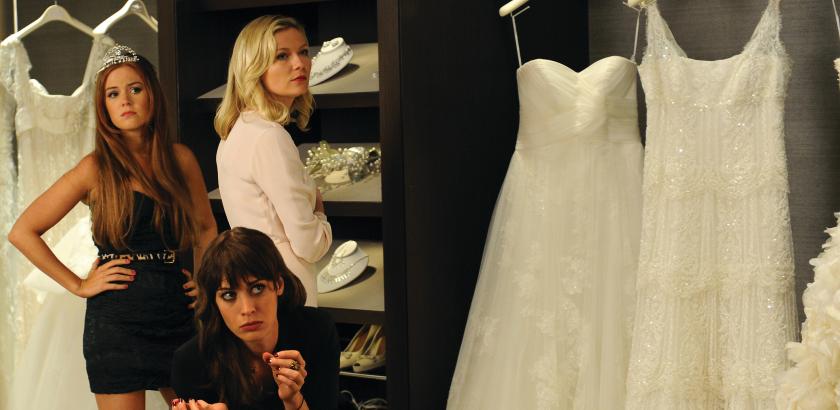
Psychoanalysis identifies the ‘return of the repressed’ as the process where past traumas previously buried in the unconscious, bubble up to the surface when appropriately triggered. The school reunion film often offers a light version of this experience, where characters who felt that they had moved beyond the dynamics of the schoolyard find themselves revisiting the petty rivalries, insults and cliques. In Bachelorette the trigger for the unwanted blast from the past is an old school-friend’s wedding where the characters must confront not only their old school mates, but the toxic foundations of their friendship. While following the format of recent pre-wedding disaster films such as Bridesmaids (Paul Feig, 2011) and The Hangover (Todd Phillips, 2009), Bachelorette is possibly better thought of as a darker and more painful spin on films such as Romy and Michele’s High School Reunion (David Mirkin, 1997).
Written and directed by Leslye Headland, based on her play of the same name, Bachelorette is a tightly constructed ensemble piece. The three leads are the judgemental and self-important Regan (Kirsten Dunst), promiscuous and self-loathing Gena (Lizzy Caplan) and vacuous and shallow Katie (Isla Fisher). The film begins with a prologue set a few months earlier when the trio hear the news that their overweight and frequently picked on friend Becky (Rebel Wilson) is not only getting married, but getting married to the kind of man the rest of them would happily settle down with. While congratulating Becky through gritted teeth Regan is infuriated, Gena finds the whole thing a hassle and Katie is keen to use the occasion to take cocaine. They are essentially unlikeable characters and their resentment towards Becky and often towards each other would make it hard to believe that they were ever friends in the first place if Headland’s script didn’t bristle with so much authenticity.
Bachelorette works best when focused on the characters rather than the actual mishaps that happen to them during the night before Becky’s wedding. These characters would be insufferable if they weren’t so familiar and if the performances and Headland’s direction didn’t allow more complex layers of characters to gradually come through. Fortunately Dunst, Caplan and Fisher are excellent performers and handle the drama/dark comedy blend with ease. In her film début Headland shows considerable promise managing all the subplots while keeping the focus on the three protagonists, often literally by getting the camera very tightly framed around their faces, encouraging the audience to focus on what is being left unsaid.
The first half of the film is played mainly for laughs as the audience are introduced to Regan, Gena and Katie’s bad behaviour and the situation they create and then have only a few hours to sort out. While maintaining the almost farcical narrative structure the film sets up for itself, it is during the second half that the material really begins to shine. Themes such as bullying, suicide, unwanted pregnancies and eating disorders are hinted at through throwaway lines earlier in the film, but then fleshed out later. The material becomes increasingly uncomfortable since it mainly comes from sad and traumatic places. This is what gives the film its edge and while Regan, Gena and Katie aren’t miraculously redeemed and healed after one night of self-discovery, there is a sense of catharsis and self-realisation. Most importantly is that while the trio begin the film unsympathetic and being defined by their flaws, the film goes on to create a much more complex picture of who these three women are, although more so in the case of Regan and Gena as Katie is underdeveloped by comparison.
The integration of the three men from the groom’s party into the story provides a counter-balance to the women, with each man being more or less the masculine equivalent of one of the main trio. Regan’s domineering nature is mirrored by the chauvinistic Trevor (James Marsden) while Gena’s self destructive promiscuity is reflected in the behaviour of her ex-boyfriend Clyde (Adam Scott). Less successful is the pairing of Katie and loveable nice guy Joe (Kyle Bornheimer) since the dynamic is more paternal and lacks the power play and verbal sparring that we get from the other two pairs. While the male characters present a range of masculinities as a comparison to the range of femininities that the women provide, the male characters are the least interesting aspect of the film and Bachelorette would have been better if it only focused on the women.
It is unfortunate that Bachelorette has been released somewhat in the shadow of Bridesmaids and even though a direct comparison isn’t fair, it’s not unreasonable either considering the thematic and narrative similarities. However, with the exception of a scene where Clyde makes an embarrassing public speech (one of the film’s weaker moments) it contains a different type of humour to Bridesmaids. Both films effectively use comedy to comment on modern friendships, especially between women, and the phenomenon of being in your thirties and still overly defined by who you were as a teenager. While Bridesmaids was overall a more celebratory and hopeful film, Bachelorette presents something far bleaker. In this sense it doesn’t offer the same degree of instant gratification while watching it, but the prevailing sadness under the surface means that it unexpectedly lingers in the mind for far longer.
